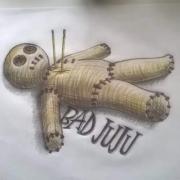Used to drive for work a lot and drove up on two different accidents where people died. Unfortunately, all I could do was essentially hold their heads and watch them pass away. All I can think is that I gave them some sort of comfort while they passed. It has steeled me to get more training though, so I guess it's a win/win in that regard.
It is something that haunts my dreams to this day. Being there and NOT knowing what to do in the most basic of manners. Haunting.
I knew a bit, but these people were DOA essentially. There wasn't anything I could really do. There was so much blood. The one lady probably shouldn't have even been conscious with as much of her face that was missing but I held her there, and she seemed at peace. God bless those that deal with this on a daily basis, as I don't want to have to deal with it ever again!





 Reply With Quote
Reply With Quote




